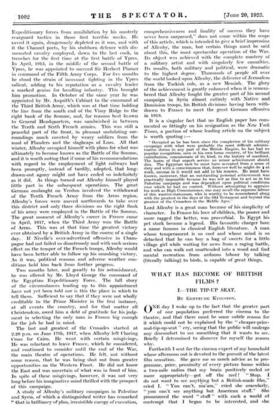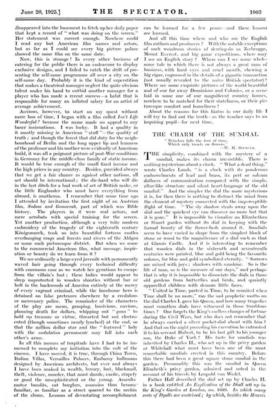WHAT HAS BECOME OF BRITISH FILMS
I.—THE TIP-UP SEAT.
BY GERTRUDE KINGSTON.
ONE day I woke up to the fact that the greater part of our population preferred the cinema to the theatre, and that there must be some subtle reason for it which could not be explained by the " cheaper-price- and-tip-up-seat " cry, seeing that the public will undergo any discomfort to see something that it wants to see. Briefly I determined to discover for myself the reason why. Forthwith I sent for the cinema expert of my household whose afternoon out is devoted to the pursuit of the latest film sensation. She gave me so much advice as to pro- granune, price, proximity of every picture house within a two-mile radius that my brain positively reeled or more appropriately—got off the reel ! " Stop. I do not want to see anything but a British-made film," cried I. " You can't; ma'am," cried she oracularly, " you can't see anything but American stuff." She pronounced the word " stuff " with such a world of contempt that I began to be interested, and she disappeared into the basement to fetch up her daily paper that kept a record of " what was doing on the screen." Her statement was correct enough. Nowhere could I read any but American film names and actors, but as far as I could see every big picture palace showed the same film on the same date.
Now, this is strange ! In every other business of catering for the public there is an endeavour to display exclusive designs, and I failed to catch the drift of pre- senting the self-same programme all over a city on the self-same day. • Probably it is the kind of superstition -that makes a theatrical manager neglect the quite obvious talent under his hand to outbid another manager for a player who has made a recent success—a habit that is responsible for many an inflated salary for an artist of average achievement.
Anxious, however, to start on my quest without more loss of time, I began with a film called Isn't Life Wonderful ? because the name made no appeal to any -baser insinuations. I was lucky. It had a quality in it mostly missing in American " stuff "—the quality of truth ; and though the forest that did duty for the neigh- bourhood of -Berlin and the long upper lip and leanness of the professor and his mother were evidently of American build, it was all a poignant picture of post-War conditions 'in Germany for the middle-class family of static income. It would be true enough of the small fixed income and the high prices in any country. • Besides, provided always that we get a fair chance as against other nations, all art should be international ; the die-hard who will die In the last ditch for a bad work of art. of British make, or the little Englander who must have everything from abroad, is anathema. I remember that some time ago I attended by invitation the first. night of an Austrian film, Sodam and Gomorrah, part of which was Bible history. The players in it were real actors, not mere acrobats with special training for the screen. .Yet another production, although a very trite modern embroidery of the tragedy of the eighteenth century Konigsmarek, took us into beautiful fortress castles overhanging crags and forests and rivers of the Ahlgau - or some such picturesque district. But when we come to the commercial American film, what message, inspir- ation or beauty do we learn from it ?
We see ordinarily a large-eyed juvenile with permanently waved hair going through every technical difficulty with enormous ease as we watch her gyrations to escape .from the villain's lust ; these ladies would• appear to sleep unprotected in wooden shanties without bar or bolt in the backwoods of America entirely at the mercy of every vagrant criminal, while the handsome hero is detained on false pretences elsewhere by a credulous or mercenary police. The remainder of the characters of the play are mean, grasping, lascivious, envious, planning death for dollars, whipping out " guns " to hold up treasure or virtue, thwarted but not electro- cuted (though sometimes nearly lynched) at the end, so that the million dollar star and the " featured " lady with the ondulation pernzanente may fall into each other's arms.
In all this morass of turpitude have I had to be im- mersed to . complete my initiation into the cult of the Cinema. I have moved, it is true, through China Town, Italian Villas, Versailles Palaces, Embassy ballrooms designed by American architects, but ever and always I_ have been soaked in wealth, luxury, lust, blackmail, theft, violence, murder, that must dazzle, excite, stupefy or goad the unsophisticated or the young. Assaults niotor bandits, cat burglars, assassins thus become- familiar, as familiar as a street quarrel to the urchin of the slums. Lessons of devastating accomplishment -can be learned for a few pence—and these lessons are learned.
And all this time where and who are the English film authors and producers ? With the notable exceptions of such wondrous stories of derring-do as Zeebrugge, Mount Everest, and big game expeditions, where may I see an English story ? Where can I see some whole- some tale in which there is not always a great man of .business, with hard eyes and cruel mouth, chewing a .big cigar, engrossed in the details of a gigantic transaction (not usually revealed to the naive British spectator) ? Where sec some exquisite pictures of the world beautiful and of our far away Dominions and Colonies, or a scene laid in some one of our magnificent country houses, nowhere to be matched for their stateliness, or their pic- turesque comfort and homeliness ?
About the reasons for this hiatus in our daily life I will try to find out the truth—as the teacher says to an inquiring pupil—for next time.











































 Previous page
Previous page